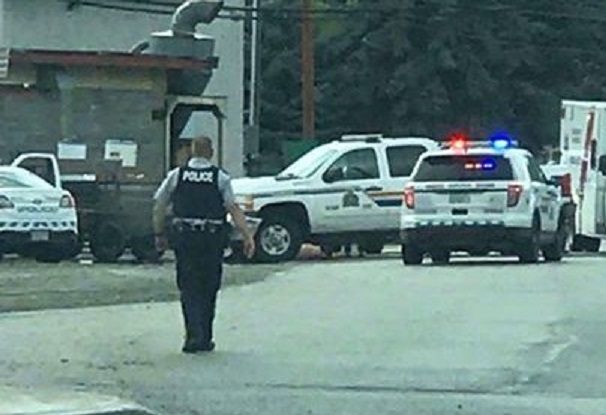When Brian Taylor ran for mayor of Grand Forks in 1997, a town of about 4,000 in B.C.’s West Kootenay region, he saw there was a surveillance camera atop the historic 1911 city hall building.

Cameras, Taylor acknowledges, are good for protecting property.
And now, due to growing vandalism and theft of city property in the last year, council has approved the purchase and installation of a number of surveillance cameras to help stop the crimes.
“I’m not surprised at the pressures that are on with COVID,” Taylor told Global News on Tuesday, following the release of police stats for the town during the first quarter of 2021.
Calls for RCMP service in Grand Forks are up four per cent over last year, according to local police, noting there were 679 calls in the first three months of 2021 compared to the same timeframe in 2020.
Residential break and enters jumped from two reports in 2020 to 10 in 2021, according to RCMP.
Calls for wellbeing checks rose from 28 to 39.
Taylor believes the increase in certain crimes reflects the current pandemic impact.
- Canadian man dies during Texas Ironman event. His widow wants answers as to why
- ‘Sciatica was gone’: hospital performs robot-assisted spinal surgery in Canadian first
- Canadians more likely to eat food past best-before date. What are the risks?
- Treatment from female doctors leads to lower death rates, study finds
“In these tough times, people turn to criminal activity as a way of making a living,” he said.
While Taylor is supportive of the government financial supports, both federal and provincial, he suggests CERB money (Canadian Emergency Response Benefit) can only go so far.
“I don’t think you can undo the damage that’s going on, that you can mitigate the damage completely” Taylor said. “It’s pervasive.
“Everybody’s hurting.”
To support the community’s most vulnerable, a homeless shelter in Grand Forks has been granted a one year extension.
It was a decision, Taylor said, that split council but ultimately passed by a vote of 4-3.
There are upwards of 15 people that call the shelter home, he said.
“I think that we had council taking in the needs of the greater community as opposed to reacting just to a few of the ‘not in my backyard’ people that come forward in these situations,” Taylor said.

The commanding officer of the Grand Forks RCMP detachment supported the continued operation of the shelter.
“I think people need to start getting their head wrapped around the idea that shelters are not a big city problem and a ‘nice to have’. They’re a ‘need to have’ in most communities if not all,” Sgt. Darryl Peppler told Global News.
“We have vulnerable people and given the economical hardships that so many people face right now, more and more people are using shelters and food banks and other resources.”
Peppler praises the work Boundary Family Services has done running the Grand Forks shelter.
“They do it extremely well,” he said. “They keep in contact with us, open communication. They keep in contact with our other partners and they’ve also reached out to the neighbourhood and the community.”
Meanwhile, Peppler expects an upswing in police calls into the spring and summer, as his nine members get busier when tourism increases.
He’s also looking to see if another current curious trend continues: dropped 9-1-1 calls have fallen from 35 to 16.
Like the mayor has found, sometimes what you see isn’t always the whole story.
It turns out that camera atop Grand Forks city hall he saw in 1997 was never actually wired up at all, he said — a fact that he stumbled on years later when someone actually needed to see what was happening down the street.
This time, Taylor said, their small town will be better prepared.





Comments